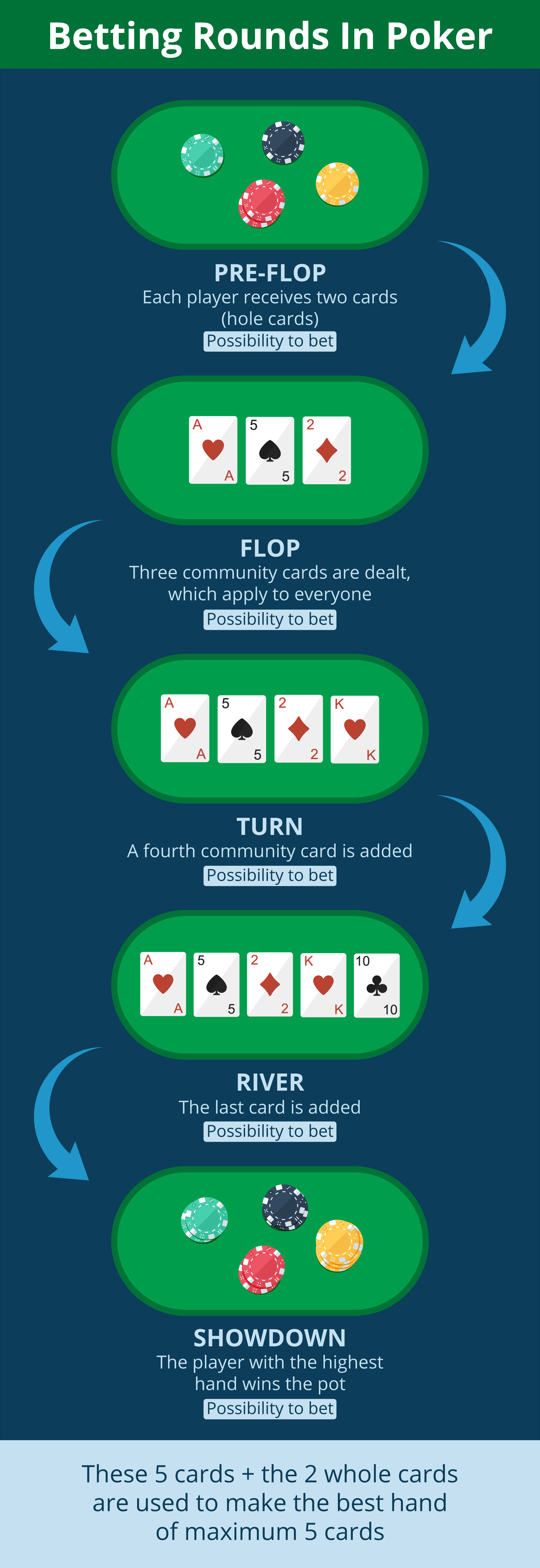Master Poker Rules
In this section, we’ll explain everything you need to know when it comes to the rules of poker. We’ll tell you about both simple poker rules and not-so-simple ones. That way, when you’re ready to play at a poker casino, you’ll be ahead of the game.
The objective
The main objective in poker is to have the best hand. While this sounds simple, there are many factors to consider, which we’ll discuss in the different sections of this article. The rules are the same whether you play at an online casino or a brick-and-mortar one.
Poker Hands Ranking
Not all poker hands are equal; one unwritten basic poker rule is knowing their names. You’ll find all the information below for traditional poker. Bear in mind there are variations that might vary this a bit.
| Hand name | How it works |
|---|---|
| High card | If there are no combinations, the highest card wins. If necessary, the other cards apply to break a tie. In the following hands, this high card and the ones that follow are used to break a tie. |
| One pair | Two cards, both of matching rank. The highest pair wins in a tie. |
| Two pair | Two cards of a matching rank and two of a different matching rank. The highest pair wins. |
| Three of a kind | Three cards of matching rank. In a tie, the highest one wins. |
| Straight | Five cards numerically sequenced, not necessarily of the same suit. The Ace works both as the highest and lowest card value. |
| Flush | Five cards with a corresponding suit, not numerically ordered. |
| Full House | Three cards of the same rank, two cards of a different matching rank. |
| Four of a Kind | Four cards correspond to the same rank. |
| Straight Flush | Five cards, the same suit, and numerically ordered. |
| Royal Flush | The top hand. It’s a specific Straight Flush with an Ace, King, Queen, Jack, and 10 of the same suit. |
Pre-flop, Flop, Turn, River, Showdown

Besides understanding poker hands, it’s important to know the different stages of the game. You’ll find all the information below.
- Pre-flop
This is when players receive their cards, and the first round of betting happens. You need to assess your hand and decide whether to fold, call, or raise.
- Flop
After the pre-flop, the dealer reveals the flop. These are three community cards that are dealt face-up. Then there’s a second betting round where you can fold, call, or raise, considering the new cards on the table.
- Turn
When the second betting round is over, the dealer reveals the fourth card, called the “turn”. Again, this is followed by another betting round with the same implications as before.
- River
After the third betting round, the dealer reveals the “river” card. This is the last community card; there’s another round of bets where you can fold, raise or call.
- Showdown
Finally, the last players standing have to reveal their cards, and the best hand wins. This is determined by combining the player and community cards to form winning combinations.

Dealer Button
In offline poker, there’s a small disc that indicates which player is the dealer for the current hand. Each player takes turns in being the dealer, and the button moves clockwise around the table.
This is important because the button player is the last one and can check the decisions of the rest; besides, it determines who makes the blind bets.
This button doesn’t exist in online live dealer poker.
Big and Small Blinds
In normal land-based poker games, there are two mandatory bets: the Small Blind and the Big Blind. These are made by the two players on the left of the dealer, and they’re made before any cards are dealt.
The Big Blind is normally double the size of the Small Blind and determines the minimum bet for the rest of the hand since you can’t bet less money than the Big Blind in most poker variants.
Once these bets are made, the pre-flop phase starts.
No limit, pot limit, and limit
When it comes to betting amounts, there are several poker game types. Here’s what each of these means.
- No limit
In this version, you can bet any amount above the big blind on any betting round.
- Pot limit
You can bet the current pot size as the maximum bet in the pot limit version. So, if the current pot is 100 AED, you can make a bet of 100 AED.
- Limit
In a limited game, there are specific limits to bet size and raises. For example, the bets and raises can be limited to 10 AED in the first two rounds and 20 AED in the last ones.
Rule variations
There are a substantial number of poker variants. This means that while the rule changes provide a different gaming experience, they’re not drastically different. Here are some of the top variants players in the UAE can find:
- Texas Hold’em
- Omaha
- Seven-Card Stud
- Five-Card Stud
- High Low Chicago
Types of Bets in Poker
It’s important to understand what are the different types of bets available on poker, so you can develop some poker strategies. Here are the most important ones:
Call in Poker
This is when a player matches the amount of money of the previous bet. You need to make this bet as the minimum required to keep playing.
Raise in Poker
It means that a player bets a higher amount than the previous bet. It’s important to know that if someone raises a bet, all the other players need to either call it or raise it themselves to keep playing.
Fold in Poker
This is when a player decides to drop out of the game. The money that this player has bet remains in the pot.
Poker “All in”
This is the classic “movie” bet, where a player commits all their money to the pot. If you do this, other players can “call” but don’t need to reach your amount. For instance, if your “all in” equals 100 AED, the caller contributes their total, which can be less than yours.
Poker odds and payouts
Another important factor when playing poker is understanding the odds. This, combined with a good knowledge of payouts, will give you an important tool to refine your playing style. Here’s a chart with information, so you don’t need a poker odds calculator.
| Outs | Flop to Turn | Turn to River | Turn and River |
|---|---|---|---|
| 20 | 1.35 to 1 | 1.30 to 1 | 0.48 to 1 |
| 19 | 1.47 to 1 | 1.42 to 1 | 0.54 to 1 |
| 18 | 1.61 to 1 | 1.56 to 1 | 0.60 to 1 |
| 17 | 1.77 to 1 | 1.71 to 1 | 0.67 to 1 |
| 16 | 1.94 to 1 | 1.88 to 1 | 0.75 to 1 |
| 15 | 20.13 to 1 | 2.07 to 1 | 0.85 to 1 |
| 14 | 2.36 to 1 | 2.29 to 1 | 0.95 to 1 |
| 13 | 2.62 to 1 | 2.54 to 1 | 1.08 to 1 |
| 12 | 2.92 to 1 | 2.83 to 1 | 1.22 to 1 |
| 11 | 3.27 to 1 | 3.18 to 1 | 1.40 to 1 |
| 10 | 3.70 to 1 | 3.60 to 1 | 1.60 to 1 |
| 9 | 4.22 to 1 | 4.11 to 1 | 1.86 to 1 |
| 8 | 4.88 to 1 | 4.75 to 1 | 2.17 to 1 |
| 7 | 5.71 to 1 | 5.57 to 1 | 2.60 to 1 |
| 6 | 6.83 to 1 | 6.67 to 1 | 3.15 to 1 |
| 5 | 8.70 to 1 | 8.20 to 1 | 3.93 to 1 |
| 4 | 10.75 to 1 | 10.50 to 1 | 5.06 to 1 |
| 3 | 14.67 to 1 | 14.33 to 1 | 7.00 to 1 |
| 2 | 22.50 to 1 | 22 to 1 | 10.90 to 1 |
| 1 | 46 to 1 | 45 to 1 | 22.06 to 1 |
House edge in Poker
The house edge in poker is the commission the casino takes for hosting the game. Since the casino “doesn’t play,” the house edge works differently than in other games. For more information on this, check our house edge page.
How to Play Poker – Breakdown of a Round
You now know more about poker than before, but how does the gameplay? Here’s an explanation of a typical round when playing live dealer poker online.
Step 1: Fund your account
First of all, you need money in your casino account. Choose your favorite payment method to get started.
Step 2: Place your wager
Depending on the game type, you might need to place a bet. Remember to gamble responsibly, and don’t bet on what you can’t afford to lose.
Step 3: Cards are dealt
After the wagering phase, the cards are dealt. Live dealer poker will display your cards onscreen rather than have the dealer hand them out. If it’s the first round, two cards are ‘dealt’ to each player. In successive rounds, community cards are dealt.
Step 4: Make your combinations
When you’re analyzing the game, make sure to find the best combinations. If you’re unsure about your skills, you can check some poker strategies to improve your game.
Step 5: Showdown
After everything is said and done, the best hand wins. With live dealer poker, you only need to worry about having a better hand than the dealer since you’re not up against other players.
Step 6: Collect your winnings
If you’re lucky enough, the pot is yours! However, remember that there are different payouts according to the previous table.
Ready For Some Poker Action?
After everything we’ve shared here, you now understand what poker is about and how important in-depth knowledge of this game is. Live dealer poker is played a little differently from poker in a land-based casino, but many of the same core rules apply.





